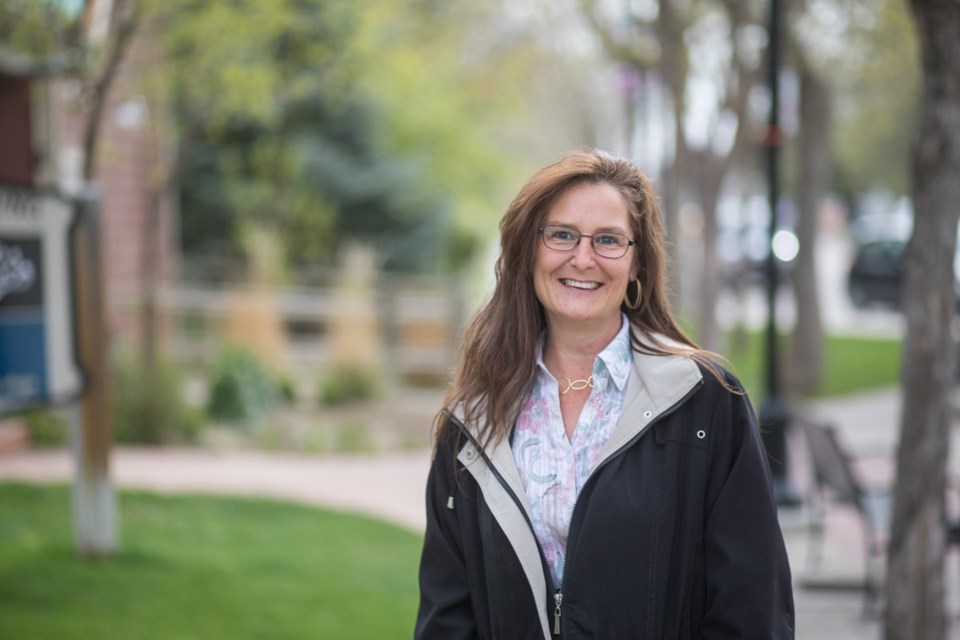The newly formed Okotoks Ratepayers Community Group informed Okotoks town council of its intention to submit petitions addressing the tiny homes project and the provincial water situation.
Co-founders Ryan Nix, Daniel Onerheim and former town councillor Naydene Lewis presented two petitions: the first to halt the taxpayer-funded portion of the Homestead project and another to send to the Alberta Legislature addressing the Highwood electoral area’s water situation.
The petition against the Homestead project, presented by Onerheim, suggests council “immediately stop the ratepayer funded portion of the project… and immediately rescind the agreement to use ratepayer-owned land, dollars, capital and operating funds or any other in kind/in lieu concessions for the Homestead project.”
Lewis presented the petition regarding the water situation, which, in its draft form, states it aims to “relieve the ongoing financial burden of costly water licenses and municipal water costs by providing means and services for the residents” and “ensure that the Sheep River and Deep Water Wells are no longer the only source of water available.”
The finalized petition will be available after June 13.
“In reality, anybody in Alberta can sign this in support of us,” she said. “We hope that the result will be in our favour, as thousands of voices speaking as one can be quite an eye-opener.”
Regulations on water licences are dependent on a moratorium from the 1980s that determined a 60/40 split on water use, with the majority dedicated to agricultural purposes.
Lewis said that since that moratorium the population has doubled, but that split has not changed to accommodate the population increase. She said in the future she hopes Alberta can review the split and agree that it is not realistic at this point.
Alberta Environment is not accepting new applications for water licences in the Bow River Basin, said Mayor Bill Robertson.
“They are stressed ecosystems, particularly our sub-basin, the Sheep is one of the most stressed ecosystems in the province,” he said. “Because they are over-allocated already, supposedly, they’re not taking anymore applications at all.”
Robertson said he was unsure of how to word such a petition because of the stress on the ecosystem, but said he would like to encourage the provincial government to look at alternatives such as rainwater usage and collection for municipal purposes.
“We think that because we’re one of the most responsible water-users in the province of Alberta, if not in all of Canada, that they should allow us some extra consideration,” he said. “A number of those considerations to this point have fallen on deaf ears.”
Lewis said the grassroots initiative was inspired through talks with Highwood MLA RJ Sigurdson, who told her that many voices by way of petition can hold more power than seven on municipal council.
“With all due respect to everything that council has done over the years, and I’ve certainly been a part of the process, it’s not enough,” she said. “It has to come from the people saying ‘we’re done, what do you want from us? How can we make this happen?’”
The ratepayers group was formed as a dedicated Facebook group for communication with the Town, based on council feedback that Facebook is not an adequate avenue of engagement in Town policy and that participation in Town surveys was low.
“The goal of our group is to represent ratepayers in the Town of Okotoks and to help facilitate more effective communication with the Town and with council,” said Nix. “We aim to do this through our revised Okotoks Ratepayers Community Group Facebook page, emails and letters to council, attending Town engagement events, possibly petitions, meetings with council and councillors, and whatever other means we can do provide additional communication for residents.”
Nix said the group hopes that by motivating residents to participate more with local government that the direction of council and administration will accurately reflect the desires of the “silent or absent majority” of residents.
“We’re not just here to pick on council or create conflict or complain, we want to have open communication with council and make sure that residents’ voices are being heard,” he said.
Okotoks CAO Elaine Vincent said to force a vote, petitions require 10 per cent of the electorate’s signatures.
“When you’re presenting a petition to council, what you’re trying to position is a moral petition where council needs to do something because the ratepayers are indicating there’s something they don’t agree with,” said Vincent. “For the Municipal Government Act, there’s actually a rule regarding the sufficiency of a petition, which legally requires them to act.”
If the petition fails to obtain the sufficient amount of signatures for legal persuasion council could still choose to review the decision on the Homestead project through moral persuasion, should a councillor that originally voted in support makes a motion for reconsideration.




